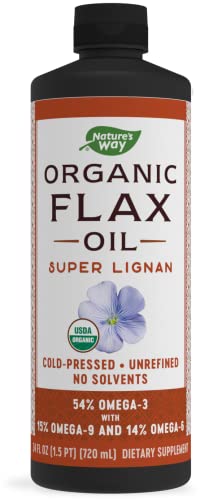
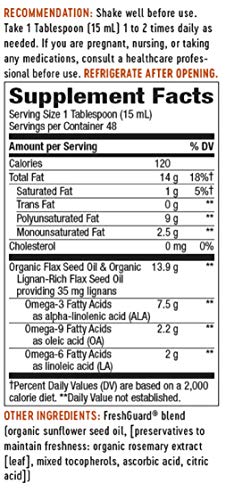
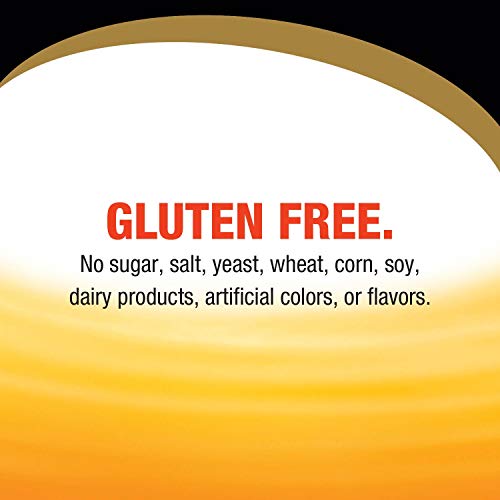
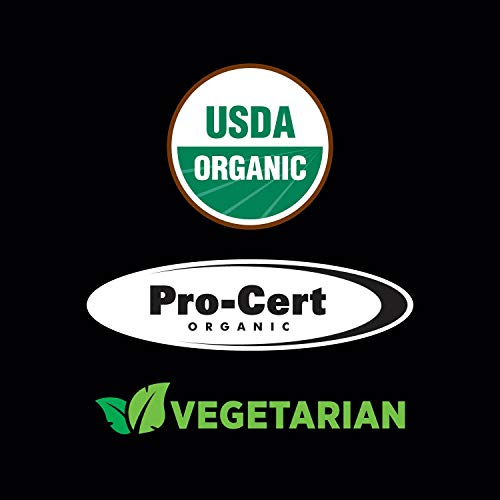
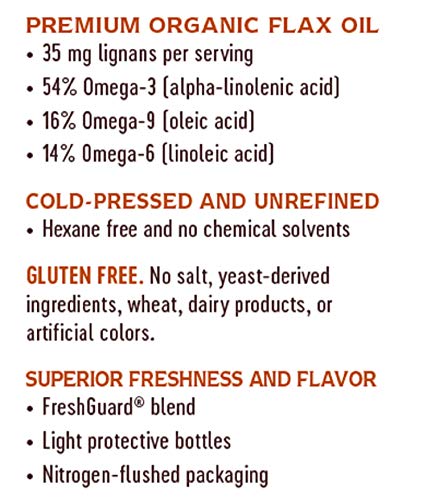
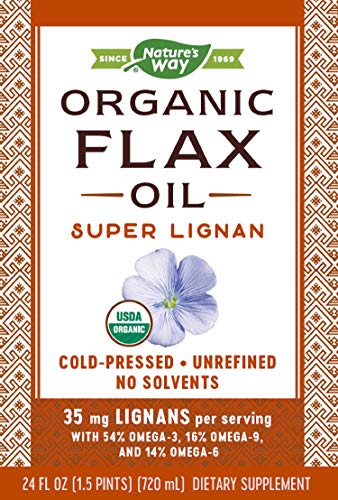
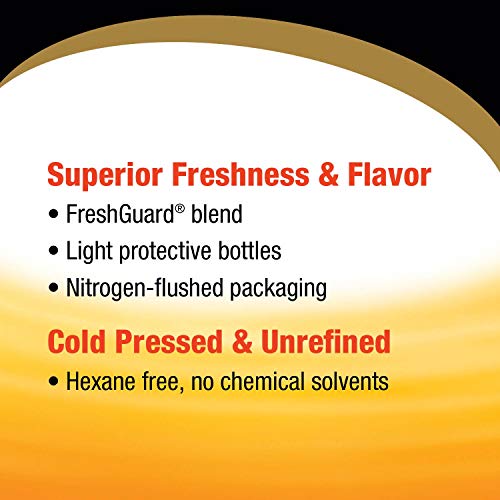
Nature's Way Organic Flax Seed Oil - Omega-3 Rich, Cold-Pressed, Gluten-Free - 24 Fl Oz


Citric Acid
Medium RiskCitric acid is an alpha hydroxy acid used in personal care products primarily for its role as a pH adjuster and natural preservative. It occurs naturally in citrus fruits and is commonly utilized in various formulations for its chelating properties and mild exfoliation benefits.
Sustai Insights
Citric acid offers functional benefits as an effective preservative and pH stabilizer, contributing to product longevity and stability. It is biodegradable and derived from renewable sources. Health risks are low, with minimal concerns regarding carcinogenicity, allergies, and reproductive toxicity. However, moderate use restrictions exist due to potential irritation at high concentrations. Environmental risks are limited, as citric acid is not known to accumulate in ecosystems. Regulatory agencies have no significant advisories against its use. Overall, it is assessed as a medium-risk ingredient, with safe usage practices recommended and alternatives available.
Linoleic Acid
Low RiskLinoleic acid is a naturally occurring unsaturated fatty acid, primarily found in plant oils such as sunflower, safflower, and corn oil. It plays a crucial role in various biological processes, including cellular membrane structure and function, as well as serving as a precursor for other essential fatty acids.
Sustai Insights
Linoleic acid is recognized for its functional benefits, including supporting skin health and maintaining cellular integrity, while being biodegradable and derived from renewable sources. Health risks are minimal, with low concerns regarding carcinogenicity, allergies, and reproductive toxicity. Environmentally, it poses low risks, with no significant pollutant potential. Regulatory bodies have not imposed major restrictions on linoleic acid, confirming its safety for use. Overall, linoleic acid presents a low risk profile, making it a viable ingredient with sustainable advantages.
Ascorbic Acid (Vitamin C)
Low RiskAscorbic acid (Vitamin C) is a naturally occurring antioxidant essential for various biological functions, including collagen synthesis and immune response. It is commonly used in cosmetic and food products for its preservative properties and ability to enhance skin brightness.
Sustai Insights
Ascorbic acid provides functional benefits as an effective antioxidant and preservative, contributing to skin health and product stability. It is generally recognized as safe with low health risks, including minimal concerns for carcinogenicity and allergies. Environmentally, it poses low risks, as it is biodegradable and does not bioaccumulate. Regulatory bodies like the FDA have not imposed significant restrictions on its use. Overall, the ingredient presents a low risk, with safe usage practices ensuring consumer safety, and alternatives such as natural extracts exist for those seeking different formulations.
Helianthus Annuus (Sunflower) Seed
Low RiskHelianthus annuus (sunflower) seed is derived from the seeds of the sunflower plant and is commonly used in various cosmetic and personal care products. It serves primarily as an emollient and skin conditioning agent, providing moisture and enhancing the texture of formulations.
Sustai Insights
Helianthus annuus (sunflower) seed offers functional benefits, including skin conditioning and moisturizing properties, while being sustainably sourced and biodegradable. Health risks are minimal, with low concerns for carcinogenicity, allergies, and reproductive toxicity. Environmentally, it presents low risks of pollution or bioaccumulation. Regulatory assessments indicate no current restrictions. Overall, it is considered a low-risk ingredient, and safe usage practices should be maintained. Alternative ingredients may include other plant-based oils, but the sunflower seed oil remains a viable option.
Linum Usitatissimum (Linseed) Seed Oil
Low RiskLinum usitatissimum (linseed) seed oil is an oil extracted from the seeds of the flax plant, primarily used for its emollient properties in cosmetic formulations. It is known for its moisturizing and soothing effects on the skin, making it a common ingredient in various personal care products.
Sustai Insights
Linum usitatissimum (linseed) seed oil is recognized for its emollient benefits, providing hydration and skin barrier support. It is sustainably sourced and biodegradable. Health risks are minimal, with low concerns for carcinogenicity, allergies, or reproductive toxicity. Environmental risks are also low, with no significant pollutant or bioaccumulative potential. Regulatory bodies have not issued restrictions. Overall, it presents a low risk, making it a safe choice in formulations. For alternatives, consider other plant-based oils like jojoba or argan oil.
Oleic Acid
Low RiskOleic acid is a naturally occurring fatty acid commonly found in various plant oils. It serves multiple functions in cosmetic and food products, including acting as an emollient, emulsifier, and a moisturizer, enhancing the texture and stability of formulations.
Sustai Insights
Oleic acid is beneficial for skin absorption and serves as an effective emollient, helping to maintain moisture levels. It is biodegradable and often sustainably sourced. Health risks are minimal, with low concerns regarding carcinogenicity, allergies, or reproductive toxicity. Environmental risks are also low, with no significant pollutant or bioaccumulation concerns noted. Regulatory bodies have not issued major warnings or restrictions. Overall, oleic acid is considered low risk, making it a suitable ingredient in various applications.
Linolenic Acid
Low RiskLinolenic acid is an unsaturated fatty acid commonly found in various plant oils. It plays a vital role as an essential fatty acid, which means it must be obtained through diet. This ingredient is used in products for its emollient properties and contribution to skin health.
Sustai Insights
Linolenic acid offers functional benefits, particularly as a moisturizer and skin-conditioning agent, and is derived from sustainable sources. Health risks are minimal, with low concerns regarding carcinogenicity, allergies, and reproductive toxicity. Environmental risks are also low, with no significant pollutant potential. Regulatory bodies have not imposed significant restrictions on its use. Overall, it presents a low risk, making it a favorable choice in formulations, although alternatives such as other plant-based oils may also be considered.
Linoleic Acid
Low RiskLinoleic acid is a naturally occurring unsaturated fatty acid, primarily found in plant oils such as sunflower, safflower, and corn oil. It plays a crucial role in various biological processes, including cellular membrane structure and function, as well as serving as a precursor for other essential fatty acids.
Sustai Insights
Linoleic acid is recognized for its functional benefits, including supporting skin health and maintaining cellular integrity, while being biodegradable and derived from renewable sources. Health risks are minimal, with low concerns regarding carcinogenicity, allergies, and reproductive toxicity. Environmentally, it poses low risks, with no significant pollutant potential. Regulatory bodies have not imposed major restrictions on linoleic acid, confirming its safety for use. Overall, linoleic acid presents a low risk profile, making it a viable ingredient with sustainable advantages.
Citric Acid
Medium RiskCitric acid is an alpha hydroxy acid used in personal care products primarily for its role as a pH adjuster and natural preservative. It occurs naturally in citrus fruits and is commonly utilized in various formulations for its chelating properties and mild exfoliation benefits.
Sustai Insights
Citric acid offers functional benefits as an effective preservative and pH stabilizer, contributing to product longevity and stability. It is biodegradable and derived from renewable sources. Health risks are low, with minimal concerns regarding carcinogenicity, allergies, and reproductive toxicity. However, moderate use restrictions exist due to potential irritation at high concentrations. Environmental risks are limited, as citric acid is not known to accumulate in ecosystems. Regulatory agencies have no significant advisories against its use. Overall, it is assessed as a medium-risk ingredient, with safe usage practices recommended and alternatives available.
Ascorbic Acid (Vitamin C)
Low RiskAscorbic acid (Vitamin C) is a naturally occurring antioxidant essential for various biological functions, including collagen synthesis and immune response. It is commonly used in cosmetic and food products for its preservative properties and ability to enhance skin brightness.
Sustai Insights
Ascorbic acid provides functional benefits as an effective antioxidant and preservative, contributing to skin health and product stability. It is generally recognized as safe with low health risks, including minimal concerns for carcinogenicity and allergies. Environmentally, it poses low risks, as it is biodegradable and does not bioaccumulate. Regulatory bodies like the FDA have not imposed significant restrictions on its use. Overall, the ingredient presents a low risk, with safe usage practices ensuring consumer safety, and alternatives such as natural extracts exist for those seeking different formulations.
Helianthus Annuus (Sunflower) Seed
Low RiskHelianthus annuus (sunflower) seed is derived from the seeds of the sunflower plant and is commonly used in various cosmetic and personal care products. It serves primarily as an emollient and skin conditioning agent, providing moisture and enhancing the texture of formulations.
Sustai Insights
Helianthus annuus (sunflower) seed offers functional benefits, including skin conditioning and moisturizing properties, while being sustainably sourced and biodegradable. Health risks are minimal, with low concerns for carcinogenicity, allergies, and reproductive toxicity. Environmentally, it presents low risks of pollution or bioaccumulation. Regulatory assessments indicate no current restrictions. Overall, it is considered a low-risk ingredient, and safe usage practices should be maintained. Alternative ingredients may include other plant-based oils, but the sunflower seed oil remains a viable option.
Linum Usitatissimum (Linseed) Seed Oil
Low RiskLinum usitatissimum (linseed) seed oil is an oil extracted from the seeds of the flax plant, primarily used for its emollient properties in cosmetic formulations. It is known for its moisturizing and soothing effects on the skin, making it a common ingredient in various personal care products.
Sustai Insights
Linum usitatissimum (linseed) seed oil is recognized for its emollient benefits, providing hydration and skin barrier support. It is sustainably sourced and biodegradable. Health risks are minimal, with low concerns for carcinogenicity, allergies, or reproductive toxicity. Environmental risks are also low, with no significant pollutant or bioaccumulative potential. Regulatory bodies have not issued restrictions. Overall, it presents a low risk, making it a safe choice in formulations. For alternatives, consider other plant-based oils like jojoba or argan oil.
Oleic Acid
Low RiskOleic acid is a naturally occurring fatty acid commonly found in various plant oils. It serves multiple functions in cosmetic and food products, including acting as an emollient, emulsifier, and a moisturizer, enhancing the texture and stability of formulations.
Sustai Insights
Oleic acid is beneficial for skin absorption and serves as an effective emollient, helping to maintain moisture levels. It is biodegradable and often sustainably sourced. Health risks are minimal, with low concerns regarding carcinogenicity, allergies, or reproductive toxicity. Environmental risks are also low, with no significant pollutant or bioaccumulation concerns noted. Regulatory bodies have not issued major warnings or restrictions. Overall, oleic acid is considered low risk, making it a suitable ingredient in various applications.
Linolenic Acid
Low RiskLinolenic acid is an unsaturated fatty acid commonly found in various plant oils. It plays a vital role as an essential fatty acid, which means it must be obtained through diet. This ingredient is used in products for its emollient properties and contribution to skin health.
Sustai Insights
Linolenic acid offers functional benefits, particularly as a moisturizer and skin-conditioning agent, and is derived from sustainable sources. Health risks are minimal, with low concerns regarding carcinogenicity, allergies, and reproductive toxicity. Environmental risks are also low, with no significant pollutant potential. Regulatory bodies have not imposed significant restrictions on its use. Overall, it presents a low risk, making it a favorable choice in formulations, although alternatives such as other plant-based oils may also be considered.
Discover Nature's Way Organic Flax Oil Super Lignan, a premium source of essential fatty acids designed for health-conscious consumers. This cold-pressed, unrefined flax oil offers a rich blend of Omega-3, Omega-6, and Omega-9 fatty acids, promoting heart health and overall wellness.
- Rich in Omega Fatty Acids: Contains 54% Omega-3 (ALA), which supports cardiovascular health and boosts overall wellness.
- Organic and Pure: Certified organic by Pro-Cert and USDA Organic, ensuring no harmful chemicals or solvents.
- Freshness Guaranteed: Packaged in light-protective bottles with nitrogen-flushed packaging to maintain optimal freshness.
- Versatile Use: Perfect for salad dressings, smoothies, or drizzling over dishes, enhancing both flavor and nutrition.
- Health-Conscious Ingredients: Gluten-free and free from artificial colors, making it suitable for various dietary needs.
Nature's Way is committed to sustainable practices, ensuring a positive impact on both health and the environment.
Subscribe & Save with Sustai
- Best Price Guarantee: Always enjoy the lowest prices on sustainable home essentials.
- No Surprises: We’ll notify you before shipping. No hidden fees, ever.
- You’re in Charge: Change, pause, or cancel your subscription anytime with ease.
- Eco-Friendly Deliveries: Our grouped shipments mean less packaging and lower emissions.
Join us on a sustainable journey. Special offers for a limited time! Prices and promotions may change.
Recommended Products
Discover Nature's Way Organic Flax Oil Super Lignan, a premium source of essential fatty acids designed for health-conscious consumers. This cold-pressed, unrefined flax oil offers a rich blend of Omega-3, Omega-6, and Omega-9 fatty acids, promoting heart health and overall wellness.
- Rich in Omega Fatty Acids: Contains 54% Omega-3 (ALA), which supports cardiovascular health and boosts overall wellness.
- Organic and Pure: Certified organic by Pro-Cert and USDA Organic, ensuring no harmful chemicals or solvents.
- Freshness Guaranteed: Packaged in light-protective bottles with nitrogen-flushed packaging to maintain optimal freshness.
- Versatile Use: Perfect for salad dressings, smoothies, or drizzling over dishes, enhancing both flavor and nutrition.
- Health-Conscious Ingredients: Gluten-free and free from artificial colors, making it suitable for various dietary needs.
Nature's Way is committed to sustainable practices, ensuring a positive impact on both health and the environment.

You can have at most 2 Sustainable Steals products in your cart
Customer Reviews
Customers’ View
Customers appreciate the quality and health benefits of the organic flax seed oil, noting its rich source of Omega fatty acids that support heart health and overall wellness. Many users highlight its versatility, using it in salad dressings, cooking, and smoothies, with one customer mentioning it as a great addition to homemade dog food for skin health. While the oil is praised for being organic and free from artificial additives, some express concerns about the sediment and sludge that accumulates, affecting its usability. Despite mixed reviews on taste, with some finding it mildly pleasant and others noting bitterness, the product remains a popular choice among those seeking a nutritious oil. Overall, customers find it a valuable and health-conscious option, though they recommend proper storage and usage to maximize freshness.
AI-generated from the text of customer reviewsThis product is rated 4.5 of 5.0 stars.
It has received 29 reviews.






